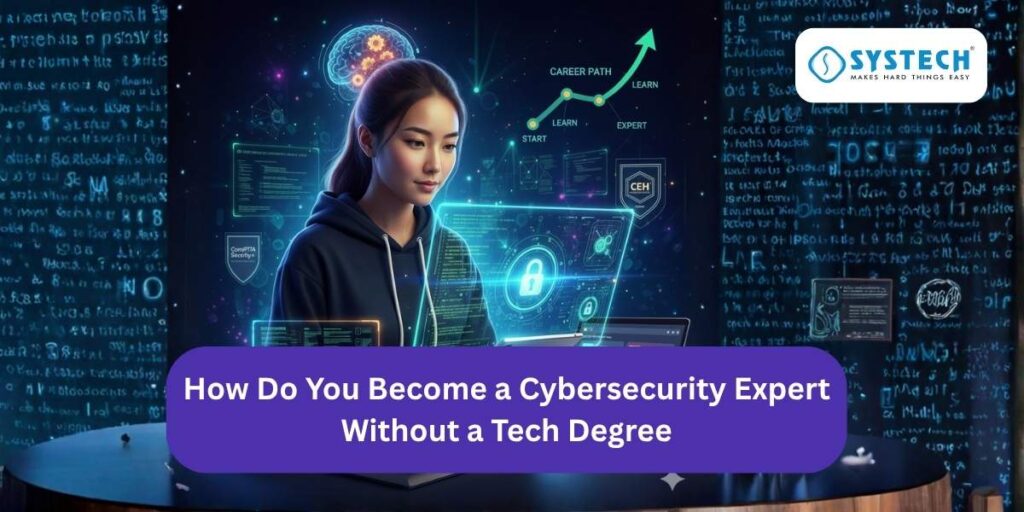Table of Contents
Breaking Into Cybersecurity Without a Tech Degree
Becoming a Cybersecurity expert may sound like a dream reserved for computer science graduates or people from IT backgrounds—but today, that’s no longer the case. With the rise of online threats and the demand for digital protection, companies need skilled professionals who can focus on threat detection and response, incident response in cybersecurity, and advanced threat protection. The best part? You don’t need a traditional tech degree to make your way into the field. With the right mindset, proper training, and a keen interest in learning, anyone can develop the skills to prevent attacks and master malware detection and prevention.
If you are passionate about solving problems, protecting sensitive information, and building a career in one of the fastest-growing industries, this guide will help you understand exactly how to become a Cybersecurity specialist even without a tech academic background.
What You’ll Learn
- Why a tech degree is not mandatory to become a Cybersecurity expert
- Key skills and certifications that matter more than formal qualifications
- Step-by-step strategies to build skills in incident response in cybersecurity
- How to practice malware detection and prevention through real-world labs
- Recommended courses and platforms to start your journey
- Practical tips for building a successful Cybersecurity career
Why Cybersecurity Is Open to All
The digital economy is booming. Organisations across finance, healthcare, government, and startups face constant threats from hackers, phishing attempts, and ransomware. To combat these risks, they require professionals who can deliver effective advanced threat protection. Employers now value skills, problem-solving, and certifications over traditional academic backgrounds.
This makes it possible for individuals without a degree in Computer Science or IT to step up, learn through online training, gain recognised certifications, and become industry-ready. That’s why people from backgrounds in arts, commerce, or other fields are now entering Cybersecurity through structured practical training.
No Degree Needed To Master Cybersecurity!
Essential Skills to Become a Cybersecurity Expert
To become a cybersecurity expert, one must master network security, threat analysis, and ethical hacking. Strong problem-solving skills, attention to detail, and a commitment to continuous learning are equally essential.
Technical Skills
Even without a degree, you must build certain technical skills to succeed:
- Networking fundamentals (TCP/IP, routers, firewalls)
- Operating systems (Linux and Windows command-line skills)
- Basics of cryptography (encryption, authentication, PKI)
Hands-on knowledge of threat detection and response tools like Wireshark, Splunk, or SIEM systems
Analytical Thinking
A Cybersecurity expert needs to think like a hacker while protecting like a defender. Strong analytical problem-solving skills help in identifying patterns and preventing attacks.
Communication Skills
Clear communication is critical in incident response in cybersecurity, where teams must act together and update stakeholders about security breaches quickly.
Certifications That Matter More Than Degrees
Earning certifications helps you prove your knowledge and stand out.
Popular Certifications for Beginners
- CompTIA Security+ – A great entry-level certification covering the basics of network security.
- Certified Ethical Hacker (CEH) – Focuses on attacking systems legally to better understand vulnerabilities.
- Cisco’s CCNA Security – Establishes your networking and security foundation.
- Certified SOC Analyst (CSA) – Ideal for roles directly involved in threat detection and response.
These certifications show employers that you have mastered practical skills, even if you don’t hold a formal computer degree.
Practical Learning: Hands-On Cybersecurity
Learn By Doing
The best way to develop expertise is through simulated labs. Many online platforms allow you to practice penetration testing, malware detection and prevention, and SIEM alert handling in real-world scenarios.
Contribute to Open Source
Joining open-source projects that focus on advanced threat protection is a great way to sharpen your skills and build a portfolio.
Start with Internships
Even if unpaid internships are available, they give invaluable exposure to real-world incident response in cybersecurity situations.
Career Paths for Non-Tech Backgrounds
Here are popular roles you can enter:
- Security Analyst – Focused on monitoring networks, performing malware detection and prevention, and analysing suspicious traffic.
- SOC Analyst – Specialises in threat detection and response in Security Operations Centres.
- Incident Responder – Deals with live attacks and develops incident response in cybersecurity frameworks.
- Cybersecurity Trainer – Educates beginners on topics like encryption, advanced threat protection, and system hardening.
From Beginner To Cybersecurity Expert Fast!
Common Myths About Cyber Security Careers
Many think cybersecurity is only hacking, but it also involves risk management, compliance, and problem-solving skills beyond just tech knowledge.
“I Need a Computer Science Degree”
Not true. Employers care about your ability to protect networks and data. Certifications and labs are often valued more.
“It’s All About Coding”
Wrong. While basic scripting is helpful, roles in threat detection and response and incident response in cybersecurity require investigation, decision-making, and configuration, not just programming.
“There’s No Growth Without Experience”
False. With Cybersecurity, entry-level roles exist through internships and online apprenticeships, giving you opportunities to build confidence.
How Training Institutes Help Build Your Cyber Security Career
Training institutes play a major role in shaping the careers of aspiring professionals who may not have a tech degree. With structured learning, mentorship, and practical exposure, they prepare students to enter the workforce confidently.
Why Choose Systech Group?
- Hands-on experience with real devices through immersive sessions covering MPLS, SD-WAN, NLD, NAS, Fibre Optic Cabling, OLT Configuration, VOIP, and SIP.
- Practical cybersecurity labs focusing on malware detection and prevention, threat detection and response, and incident response.
- Earn globally recognised certifications through Pearson VUE & PS.
- Acquire industry-oriented certifications such as CEH, CompTIA, and SOC Analyst.
- Learn from experienced trainers with years of expertise in advanced threat protection.
- Receive career mentoring tailored for learners from all backgrounds, helping you transition confidently into tech roles.
Launch your Cybersecurity career today
Action Plan: Steps You Can Take Right Now
- Start with basic networking and OS fundamentals.
- Enroll in beginner-friendly certifications.
- Practice labs daily focusing on malware detection and prevention.
- Enhance your knowledge of advanced threat protection through case studies.
- Build a portfolio by documenting your skills and practical work.
Conclusion
Becoming a Cybersecurity expert without a tech degree is not only possible but also rewarding if you commit yourself to continuous learning. With certifications, practical training, and strong problem-solving skills, you can secure roles in incident response in cybersecurity, threat detection and response, and advanced threat protection. Start now—take practical training, build hands-on experience, and transform your career path.
FAQs
Can I really become a Cybersecurity expert without a degree?
Yes. By gaining certifications and hands-on exposure, you can enter roles in threat detection and response and incident response in cybersecurity.
Do I need programming skills for Cybersecurity?
Not necessarily. While basic scripting helps, most non-degree jobs focus more on malware detection and prevention and system monitoring.
What is the role of certifications?
Certifications prove you have applied skills relevant to advanced threat protection and make you employable even without formal education.
Is Cybersecurity a good career in India?
Absolutely. The demand for a Cybersecurity expert is growing rapidly across healthcare, IT, and banking, ensuring job security.
How can the Systech Group help me?
We provide hands-on labs, certifications, and career-focused training in areas like incident response in cybersecurity and malware detection and prevention.

